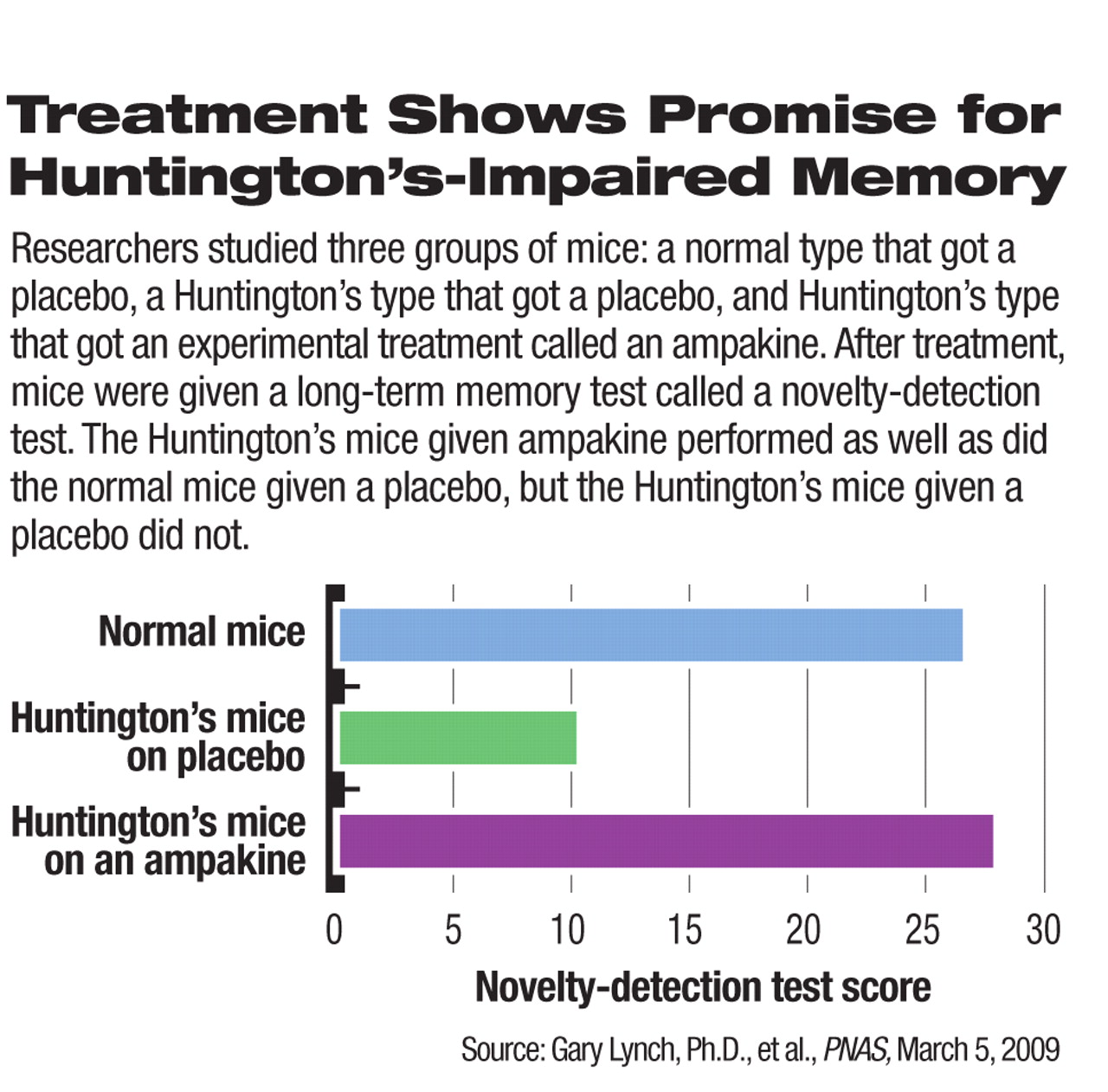Huntington's disease is an inherited neurological disease for which there is no cure. Medications such as antidepressants, sedatives, and low doses of antipsychotics are used to treat its psychological symptoms but are palliative at best.
Now, a possibly effective treatment for the memory impairments of Huntington's may have been found. It is a compound called an ampakine.
The research on this compound was headed by Gary Lynch, Ph.D., a professor of psychiatry and human behavior at the University of California, Irvine. Results were published online March 5 in the Proceedings of the National Academy of Sciences (PNAS).
Levels of a brain protein called brain-derived neurotrophic factor (BDNF) are known to be abnormally low in the brains of those with Huntington's disease. These abnormally low levels are also suspected of contributing to the memory deficits in Huntington's patients. If lab mice are genetically engineered to contain the defective gene that causes Huntington's, they develop symptoms similar to those of Huntington's patients and thus serve as models for studying the disease.
So Lynch and his colleagues decided to see whether ampakines, a class of drugs that increase the transmission of glutamate in the brain and thereby increase levels of BDNF, might have an effect on the memory of mice genetically engineered to have Huntington's.
Lynch and his coworkers studied three groups of 16-week-old mice in their experiment. There was a minimum of 15 mice in each group. One group was a normal type that got placebo injections; a second group was a Huntington's type that got placebo injections, and the third group was a Huntington's type that got ampakine injections. The animals received either a placebo or an ampakine injection twice daily for four days. They were then given a memory test 18 hours after each injection.
Compared with the normal mice that got a placebo, the Huntington's mice that got the ampakine showed the same movement deficits as did the Huntington's mice that got a placebo. Thus the ampakine appeared to have no favorable impact on Huntington's movement deficits. However, the Huntington's mice that received the ampakine showed memory as good as the normal mice that received a placebo, whereas the Huntington's mice that received a placebo did not do as well. Thus, the ampakine injections appeared to improve the mice's memories.
“That such a mild drug regimen was effective surprised us,” Lynch told Psychiatric News. “The ampakine had a half-life of [only] 15 minutes.”
Autopsies of the mice suggested that the ampakine worked by increasing the BDNF levels in the mice's brains.
Although the particular ampakine used in these experiments has not yet been tested in humans, other types of ampakines have been tested and found to be safe, Lynch said. In fact, he added, ampakines are currently being tested in clinical trials to see whether they can help subjects with sleep apnea or attention-deficit/hyperactivity disorder.
“Given that ampakines are well tolerated in clinical trials and were effective in this study after brief exposures, these results suggest a novel strategy for chronic treatment of the cognitive difficulties that occur in the early stages of Huntington's,” Lynch and his group concluded.
The research was funded by the National Institutes of Health, the Huntington's Disease Drug Works Foundation, and Cortex Pharmaceuticals Inc.
An abstract of “Up-Regulating BDNF With an Ampakine Rescues Synaptic Plasticity and Memory in Huntington's Disease Knockin Mice” is posted at<www.pnas.org/content/early/2009/03/04/0811228106.abstract?sid=90dde026-fdf7-4...>.▪

